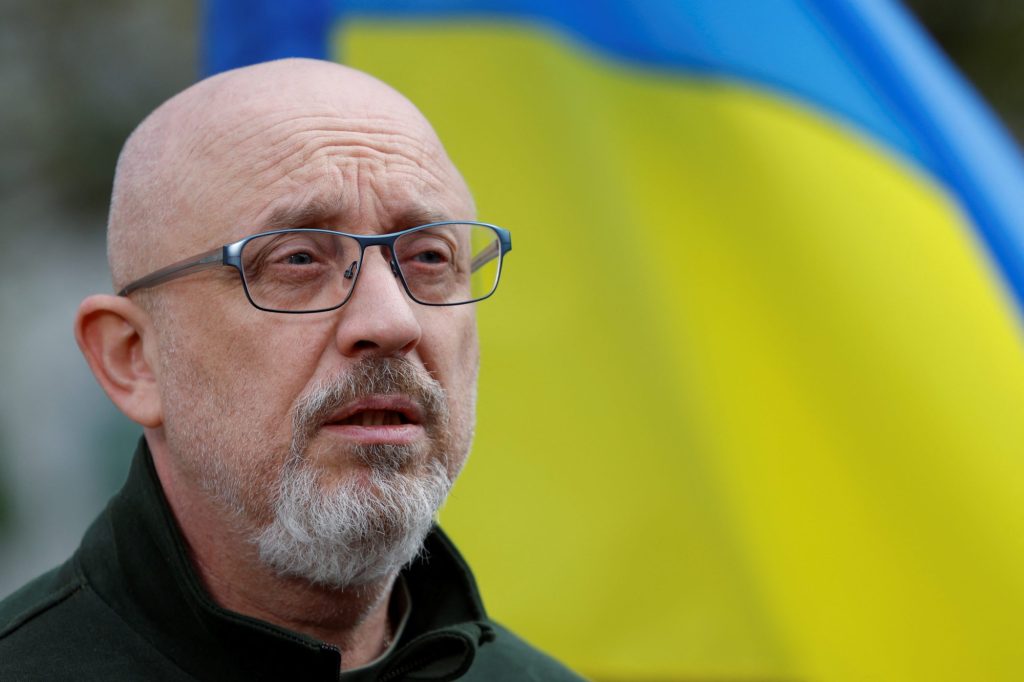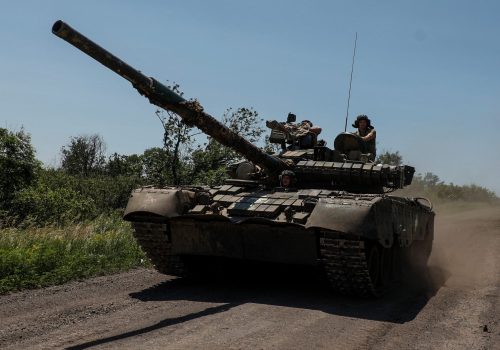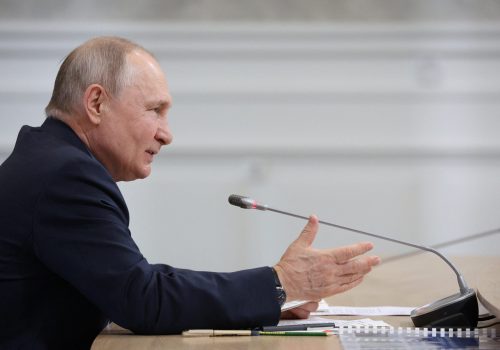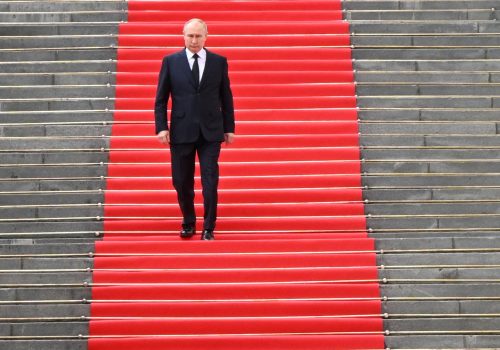Ukrainian President Volodymyr Zelenskyy has recently initiated a national debate over the creation of a Ukrainian Doctrine that will shape the future development of the country. I am confident that defense policy will be at the heart of this national dialogue and see a number of key points that are worth underlining.
The first point to note is the global nature of Ukrainian security. For decades to come, the entire world will live by the rules established by the outcome of Russia’s invasion of Ukraine. The Kremlin has demonstrated its readiness to weaponize everything from energy resources and food supplies to cyberspace and social media. Moscow has engaged in nuclear blackmail, interfered with maritime freedoms, and called into question the very idea of territorial integrity. These challenges are not local or even regional in scope; they are global threats that resonate equally around the world.
How we respond to these issues in Ukraine will define the international security climate. Any attempts to address the Russian invasion on a purely local level by freezing the conflict or forcing Ukraine into territorial concessions will result in failure and will only fuel further international instability. Instead, we must acknowledge that the threats posed by Russia are global in character and demand a global response.
The second key point is the need to define Ukraine’s position in regional and global security systems. In simple terms, the desired trajectory should include security guarantees followed by full NATO accession, with internal transformations taking place in parallel that implement the best lessons from Ukraine’s wartime experience and enable the country to acquire the necessary domestic defense capabilities. These processes can and must be advanced during the current active phase of the war.
The third key point is the need to develop a defense doctrine that meets the security expectations of both Ukraine and the country’s partners. It is now clear that Ukraine is capable of serving as a shield on Europe’s eastern frontier. Indeed, Ukraine is currently carrying out NATO’s core mission of defending Europe against Russian military aggression. At the same time, over the past eighteen months Ukraine has received direct and indirect military aid worth more than the country’s entire defense budget since the restoration of Ukrainian independence in 1991. Without continued external assistance, Ukraine will not be able to carry out rapid rearmament or acquire the kind of defense capabilities it needs. The best solution would be to move toward greater reliance on internal resources while maintaining strong levels of international support.
Clearly, Ukraine’s partners will be reluctant to invest in a security model that differs significantly from established NATO standards, or one that conflicts with their own military, industrial, or economic interests. Finding the right balance between strengthening Ukraine’s domestic defense sector capabilities and optimizing international cooperation will be crucial.
Stay updated
As the world watches the Russian invasion of Ukraine unfold, UkraineAlert delivers the best Atlantic Council expert insight and analysis on Ukraine twice a week directly to your inbox.
Efforts to develop a practical vision for Ukraine’s army of the future have been underway since June 2022, when I ordered a capacity review. These findings, coupled with Ukraine’s unique wartime experience, form the basis of a concept paper on the transformation of Ukraine’s defense sector submitted to Ukrainian Prime Minister Denys Shmyhal at the beginning of June 2023. The next stage will involve consultations to coordinate interagency efforts required to create the right legislative framework and ensure effective cooperation between different government bodies. This synergy will be the key to success.
Russia’s invasion has underlined that defense is an investment not an expense. For instance, strengthening Ukraine’s naval capabilities will help guarantee maritime security in the Black Sea and Azov Sea, which secures vital income from trade. Likewise, failure to provide adequate security measures will leave Ukraine unable to rebuild and trapped in costly wartime insecurity. All of Ukraine’s security policy decisions must reflect these fundamental truths.
Complex defense capabilities revolve around three main factors: people, weapons, and financial resources. Each has their own planning specifics. Successful weapons and financing policies take years to plan; when it comes to human resources, it often takes a generation or longer to get it right.
Ukraine is now looking to coordinate the country’s defense sector transformation under conditions of extreme uncertainty. We know the current war will end in Ukrainian victory, but we do not know when this will be. This makes it difficult to begin the process of optimizing the range of weapons in use by the Ukrainian armed forces. After all, in order to defeat Russia, Ukraine needs to receive as many weapons as it can, and needs to get them as quickly as possible.
We also don’t know exactly when Ukraine’s partners will make the final decision to fully integrate the country into the Euro-Atlantic security community. This is fundamental. It is one thing to reform the Ukrainian military as part of a collective defense strategy in cooperation with partners; it is quite another to build defense capabilities in relative isolation with some external support.
One of my main requests to our partners is therefore to make a decision on Ukraine’s NATO accession as soon as possible. This will make it far easier for all parties to conduct long-term defense planning. If a decision is not forthcoming, Ukraine’s partners will be obliged to include the country’s security needs in their own planning on a bilateral and multilateral basis.
A further priority for Ukraine’s defense doctrine is the de-Sovietization of defense policy and planning. This needs to be addressed in a practical manner that goes beyond mere slogans. Eighteen months ago, many military analysts believed a full-scale Russian invasion of Ukraine would mean a fight between a large Soviet army against a small Soviet army. In reality, it soon became clear that the Ukrainian army had undergone significant change. However, the same cannot be said for the broader state systems underpinning Ukrainian defense policy. A wide range of political, social, and economic changes are still needed.
For example, the system of registration for military service is still linked in the Soviet fashion with place of work or study. This means that entrepreneurs along with the self-employed and unemployed are often outside the system. Far-reaching changes are needed in order to establish and maintain the right kind of reserve and effectively mobilize the country’s human, material, and financial resources. Efforts to overcome quality problems with quantity must be set aside. In conditions of resource scarcity, such an approach is suicidal.
The human dimension of future Ukrainian defense is a professional army. This must be based on the transparent logic of a military career and an extensive social protection package, relying on well-trained reserves formed of all men liable for military service and of women on a voluntary basis (with the exception of those categories of women who are liable for military service).
The registration of people liable for military service should be fully digitized. This process is underway. We also need to implement separate training policies for different groups in order to create a genuine rather than nominal reserve. This should look to maximize citizen engagement by improving the motivation system.
Statements about there being seven million Ukrainians liable for military service are meaningless if the country is not capable of structuring the reserve in ways that make efficient use of these people. Similarly, declarations that anyone subject to military service must complete their compulsory period in uniform do little to help the state capitalize on existing resources. Instead, basic training should be supplemented by the development of specific groups within the country’s military reserve forces. This should include a combat reserve consisting of those with combat experience; a territorial reserve for territorial defense units; an operational reserve of military veterans without combat experience; a mobilization reserve of those who previously passed through basic training; and a general reserve register featuring individuals with no prior military training.
The development of an efficient reserve is only possible in conjuction with an effective Heroes Policy, which has been identified as a priority by President Zelenskyy. This is a good example of the need for interagency synergies and is also an area where a sense of justice must serve as a cornerstone. Meanwhile, the task of managing military registration should be taken away from the General Staff and the Land Forces Command. Instead, it is necessary to establish a separate and tailored agency within the Ministry of Defense.
Similar efforts are required for the civil reserve. Over the past eighteen months of Russia’s full-scale invasion, it has become clear that a significant portion of the almost one million Ukrainian men and women in uniform perform purely civilian functions. It makes no sense to bunch all of these people together with the military until the end of hostilities. Instead, a more nuanced approach is required. When society sees that the state seeks to engage people in defense tasks as rationally and reasonably as possible, we will witness a decline in negative phenomena associated with military service. After all, many of those who seek to avoid military service do so in order to escape perceived uncertainty, injustice, and abuses.
Eurasia Center events

A new mobilization and reserve policy will require a new regulatory framework. This will involve comprehensive legislative changes. The entire mobilization system for central and local authorities, enterprises, and institutions should undergo revision, with mobilization tasks in their current form abolished. In its place, the emphasis should be on practical needs and common sense. Training for reservists should be synchronized with real life requirements and skills, with citizens aware of opportunities at the level of school leaver, university undergraduate, employee, or entrepreneur.
Professional military education and career management must be developed according to NATO principles and standards to ensure interoperability. At the same time, all training and education should be adjusted to reflect Ukraine’s unrivalled combat experience. This is the country’s unique advantage and should shape Ukraine’s defense doctrine as much as possible.
Work is already underway on the transformation of Ukraine’s military education system, with a concept approved by the government in December 2022. Over the coming decade, Ukraine’s military education will be fully integrated into the broader European military education environment in terms of both form and content. A separate element here is military-patriotic education. At the moment, this is governed by two laws and a presidential decree which contain a number of apparent conflicts and contradictions. We must achieve a clearer division of tasks and harmonization.
Ukraine’s entire defense doctrine should be underpinned by solid economic foundations. At present, the Ukrainian defense industry is not capable of meeting the demands of the military, but the sector has huge potential. Indeed, if managed correctly, a highly profitable Ukrainian defense industry could realistically become a major engine driving the country toward the goal of a one trillion dollar GDP.
I have repeatedly stated my position that self-sufficiency in the defense sector is a core component of genuine national sovereignty. Moving forward, Ukraine should be aiming to produce as much as possible itself. Once again, Ukraine’s unique combat experience creates exciting opportunities in this area. In order to make the most of the country’s experience and its industrial capabilities, a new defense industry development strategy is required. This should take international defense sector trends into account while also focusing on other economic factors and Ukraine’s specific strengths.
The time has come to turn away from the old Soviet model governed by unprofitability and resource consumption. Instead, Ukraine must strive to become a global defense sector leader and an attractive international partner. This will require a unified center capable of establishing and implementing policy, with exceedingly flexible R&D assets responding rapidly to the latest requirements. Procurement should be synchronized with budget planning, while efforts must be made to move away from lingering problems relating to blurred responsibilities. Efforts in this direction are already underway and must continue.
The overall objective of Ukraine’s defense doctrine is to defend the state against any possible threat. This requires new approaches to everything from managing mobilization and maintaining an effective reserve, to reforming the defense industry and boosting domestic production at every level. The country’s needs will inevitably evolve over time. Five years after victory in the current war, will Ukraine need a mobilization reserve of 500,000 or two million? This is why scalability is so critical.
In the defense sector, Ukraine has huge untapped potential and much to offer the international community. In the drone sector alone, Ukraine is at the cutting edge of current innovations and is well-placed to remain a key source of solutions for European and other markets. This military tech prowess will help open doors to new cooperation that are currently closed. Ukraine can build on its experience and expertize to become a major player in the global defense industry, but this requires solid foundations and a strong domestic sector.
Every day, our defenders are bringing victory closer. This progress is taking place in a rapidly changing world, and is contributing to these changes. Ukraine must be ready to capitalize on the opportunities this creates in ways that guarantee the safety of all Ukrainians while enabling the country to prosper.
Oleksii Reznikov is Ukraine’s Minister of Defense.
Further reading
The views expressed in UkraineAlert are solely those of the authors and do not necessarily reflect the views of the Atlantic Council, its staff, or its supporters.

The Eurasia Center’s mission is to enhance transatlantic cooperation in promoting stability, democratic values and prosperity in Eurasia, from Eastern Europe and Turkey in the West to the Caucasus, Russia and Central Asia in the East.
Follow us on social media
and support our work
Image: Ukrainian Defense Minister Oleksii Reznikov gives a statement on the day of the Fourth Ukraine Defense Contact group meeting at Ramstein US Air Base in Germany. April 21, 2023. (REUTERS/Heiko Becker)




